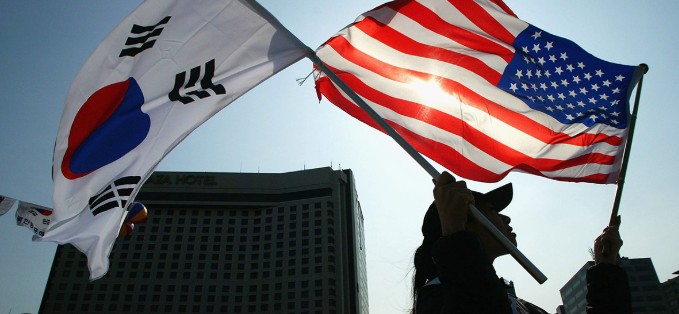Diplomacy in the Age of Deals
In an era where diplomacy is increasingly conducted through boardrooms and investment portfolios, South Korea has emerged as one of the United States’ most proactive and strategic partners. From aerospace to automotive, shipbuilding to semiconductors, Korean conglomerates are pouring billions into American soil not just to expand their global footprint, but to reinforce a bilateral alliance that has weathered decades of geopolitical shifts.
Yet, as recent events like the ICE raid on Hyundai’s Georgia plant reveal, goodwill and investment don’t always shield foreign partners from the complexities of U.S. domestic policy. This article explores the multifaceted relationship between South Korea and the United States through the lens of major corporate deals, diplomatic gestures, and the tensions that arise when enforcement collides with alliance-building.
Korean Air’s Boeing Deal More Than Just Planes
In April 2025, Korean Air stunned the aviation world by announcing a $36.2 billion order for 103 Boeing aircraft the largest in its history. The deal included:
- 20 Boeing 777-9s
- 25 Boeing 787-10s
- 50 Boeing 737-10s
- 8 Boeing 777-8 Freighters
This wasn’t just a fleet upgrade. It was a strategic move tied to Korean Air’s merger with Asiana Airlines, aimed at creating one of Asia’s most formidable carriers. The timing was equally symbolic: the deal was signed during a Korea–U.S. business summit attended by President Donald Trump and South Korean President Lee Jae-myung.
example: Boeing estimated the deal would support 135,000 U.S. jobs, reinforcing its role in American manufacturing and exports. Korean Air’s CEO Walter Cho emphasized the importance of aligning with U.S. industrial goals, stating, “This is not just about aircraft it’s about trust, partnership, and shared vision.”
Hyundai’s $26 Billion U.S. Expansion
Hyundai Motor Group followed suit with a $26 billion investment pledge, targeting EV production, robotics, and steel manufacturing across multiple states. The centerpiece: a sprawling EV and battery plant in Georgia, expected to create 25,000 direct jobs.
Hyundai’s strategy was clear localize production to avoid tariffs, align with U.S. clean energy goals, and deepen its presence in the world’s largest auto market.
example: Hyundai’s acquisition of Boston Dynamics and its partnership with U.S. steel firms positioned it as a key player in America’s industrial renaissance. The company also committed to building a robotics R&D hub in Massachusetts, signaling long-term engagement.
Rebuilding America’s Shipyards Korea’s $150 Billion Maritime Play
Perhaps the most ambitious move came from South Korea’s shipbuilding giants HD Hyundai, Hanwha Ocean, and Samsung Heavy Industries who pledged $150 billion to revitalize U.S. shipyards under the “Make American Shipbuilding Great Again” (MASGA) initiative.
The goal: rebuild aging infrastructure, modernize naval logistics, and develop advanced vessels for both commercial and military use.
example: Hanwha Ocean’s acquisition of Philly Shipyard marked a turning point. Plans to scale production from 2 ships/year to 20 were backed by a joint investment fund with Cerberus Capital and Korea Development Bank. Samsung Heavy Industries signed a deal with Vigor Marine Group to maintain and upgrade Navy vessels.
The ICE Raid When Enforcement Meets Diplomacy
Just days after Hyundai’s investment announcement, ICE agents raided its Georgia plant, detaining 475 workers many of whom were South Korean nationals allegedly working without proper authorization. The raid sparked outrage in Seoul and raised questions about the limits of economic diplomacy.
example: President Trump defended the operation, stating, “We welcome investment, but we won’t tolerate illegal employment.” Hyundai clarified that the workers were hired through subcontractors, not directly by the company. South Korea’s Foreign Ministry expressed “concern and regret,” and later negotiated the release of over 300 detainees.
Strategic Alignment vs. Sovereign Enforcement
The ICE raid highlighted a fundamental tension: while South Korea is investing heavily to align with U.S. strategic goals, American enforcement agencies operate independently of diplomatic overtures.
This isn’t unique to Korea. Similar incidents have occurred with other allies such as Germany’s Volkswagen facing EPA scrutiny, or Japan’s Takata airbag scandal leading to criminal charges.
example: In 2016, ICE raided a Mississippi chicken plant owned by a Mexican firm, detaining hundreds of undocumented workers despite the company’s compliance with trade agreements. These cases underscore the reality that economic goodwill doesn’t exempt foreign firms from U.S. law.
The Political Optics
President Trump’s administration has emphasized “America First” policies, which include both welcoming foreign investment and cracking down on immigration violations. For South Korea, this means walking a tightrope investing billions while ensuring compliance with complex U.S. labor laws.
example: During a press briefing, Trump stated, “We love Korea. They’re investing in our country like never before. But we also have laws, and those laws will be enforced.”
President Lee Jae-myung responded diplomatically, noting, “Our partnership with the United States is built on mutual respect. We will work to ensure our companies meet all legal standards.”
The Bigger Picture Indo-Pacific Strategy and China
South Korea’s investments also serve a strategic purpose in the Indo-Pacific region. By deepening ties with the U.S., Seoul strengthens its position against regional pressures from China and North Korea.
example: The shipbuilding initiative includes plans to build LNG carriers and auxiliary vessels that could support U.S. naval operations in the South China Sea. Korean Air’s expanded cargo fleet enhances logistical capabilities for humanitarian and defense missions.
Lessons Learned and Future Outlook
The ICE raid was a wake-up call for Korean firms. Expect tighter oversight of subcontractors, more direct hires, and greater legal transparency. But the broader relationship remains strong anchored in shared values, strategic interests, and economic interdependence.
example: Following the raid, Hyundai announced a new compliance task force and pledged to work closely with U.S. immigration authorities. Korean Air reaffirmed its commitment to Boeing, and Hanwha Ocean accelerated its shipyard modernization plans.
Allies, Not Adversaries
South Korea’s billion-dollar investments in the U.S. are more than business they’re a declaration of trust, ambition, and strategic alignment. While incidents like the ICE raid reveal the complexities of cross-border cooperation, they also highlight the resilience of a partnership built on decades of shared goals.
As both nations navigate the challenges of enforcement, trade, and diplomacy, one thing is clear: the U.S.–South Korea alliance is evolving not unraveling. And in a world where influence is measured in both aircraft orders and immigration compliance, the future of this relationship will be shaped not just by what’s signed in boardrooms, but by how it’s managed on the ground.

